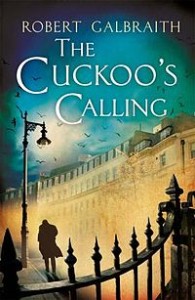The pros and cons of using a pen name
The pros and cons of using a pen name
The pros and cons of using a pen name
-
Hannah
-
Hannah
 Readers, writers, publishers – the book world has been in uproar this week following the revelation that a recently published crime novel by ‘Robert Galbraith’ was in fact by the world’s most famous author: JK Rowling. Rowling was exposed by the Sunday Times, which had commissioned Professor Peter Millican of Hertford College, University of Oxford, to compare a range of writing samples to hunt for marked similarities between the novel in question, The Cuckoo’s Calling, and Rowling’s other works, Harry Potter and The Casual Vacancy.
Readers, writers, publishers – the book world has been in uproar this week following the revelation that a recently published crime novel by ‘Robert Galbraith’ was in fact by the world’s most famous author: JK Rowling. Rowling was exposed by the Sunday Times, which had commissioned Professor Peter Millican of Hertford College, University of Oxford, to compare a range of writing samples to hunt for marked similarities between the novel in question, The Cuckoo’s Calling, and Rowling’s other works, Harry Potter and The Casual Vacancy.
Rowling is quoted by the BBC as saying she had ‘hoped to keep this secret a little longer’ and that he ‘being Robert Galbraith’ was ‘such a liberating experience’. No doubt she expected to be ousted at some point (in a 2001 interview she admitted as much; see www.bbc.co.uk/news/entertainment-arts-23304181). But I wonder how much she wishes she could have continued writing quietly under the pen name, and enjoyed her writing without the world holding up each and every word for scrutiny.
I think we can all understand why JK Rowling chose to use a pen name. The advantage of doing so is powerful: total anonymity allows you to write what you want, how you want, when you want:
- What: Under a pen name, you can explore a range of genres. Just because you’ve always written romance doesn’t mean that’s all you can write. Just as a reader enjoys more than one genre of book, so a writer enjoys writing different kinds of stories.
- How: As a writer, you can toy with your writing style, experiment with a new voice, try out a different kind of structuring.
- When: Many authors, such as the romance and teen writer Meg Cabot and the thriller writer Dean Koontz, admit to using pen names to give them freedom to be prolific. There’s a certain snobbishness in some critics that authors should spend years over a work, and yet many authors can decent write books much faster than this.
In addition, for many writers a pen name is a means of creating an author identity – a brand, if you like, for marketing. If your name is Marmaduke Dull, for example, and you write erotic fiction, you may prefer to publish your books under a more current, edgy name. Or, indeed, conceal your gender – it’s telling indeed that JK Rowling (already writing under initials to make her female gender less obvious) chose a male pen name to appeal in what is seen by many as a male-centric genre.
But what of the pitfalls of pen names? Well, it really depends how open you are about the pen name. If you’re open – Stephen King, for example, is known to write as Richard Bachman – then life is quite straightforward. You just have to remember not to muddle who you are in delicate situations; so you don’t email a fan using your real, not pen, name. But if, like JK Rowling, you’d really like your actual identity to remain hidden, that can make your work as an author a little harder.
First, you have to separate strictly all real-you media and pen-name-you media. It’s no good using the same headshot on your personal Twitter page, for example, as you do on your pen name one. You need to do your best to make sure that to the outside world, these people look entirely separate (and yes, that means no posting reviews of your own book in your personal Amazon account, as some authors have been discovered doing!).
But the real concern is marketability. Authors today have to market extensively, so your author name becomes a sort of brand that you build up over time. If your personal life really doesn’t relate to your writing then separating the two by using a pen name is simple. But sometimes using a pen name comes at a cost to marketing. Say, for example, you’re a high-flying member of the police force and you’ve written a crime novel. To publish under a pen name and make no reference to your extensive and impressive experience of crime is, in marketing terms, missing the boat.
Of course, JK Rowling publishing under Robert Galbraith was most definitely missing a marketing trick. She sold 1,500 copies of the book before the news of her authorship broke; I can only imagine how those sales have soared since. Perhaps she – or her publisher – always intended the news to come out. Or perhaps Rowling was quite happy not to push for success in commercial terms with this book.
Whatever the truth, it has been interesting to watch talk of pen names flood the media, and I think the story that has most stood out is that JK Rowling’s pseudonymous book was rejected by publishing house Orion (which is no doubt regretting that now). It just goes to show that even the best, more respected, most highly paid writers in the business aren’t necessarily guaranteed success on talent alone when you strip away that all-important brand.